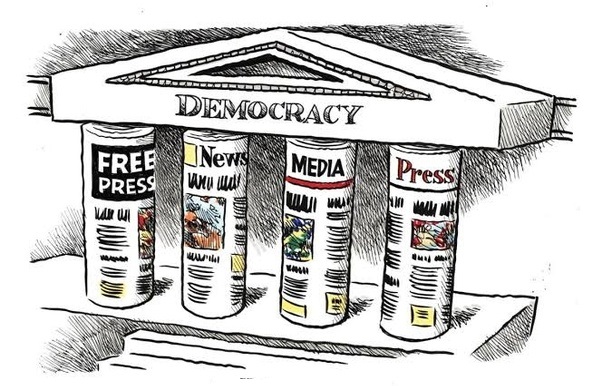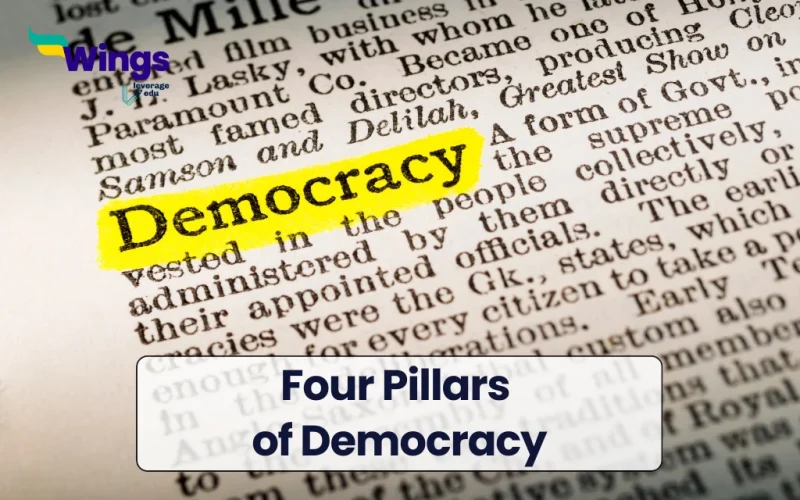Pillars are essential to any strong structure because they support and uphold its foundation. Similarly, a democratic system also stands on key pillars that give it strength, balance, and stability. Democracy promotes values such as liberalism, secularism, equality, and freedom—but to protect them, a robust framework is required.
This is where the Four Pillars of Democracy play a crucial role, ensuring smooth functioning and accountability within the political system.
What are the Four Pillars of Democracy?
While some countries consider only three pillars of democracy, India recognises four pillars:
- Legislature
- Executive
- Judiciary
- Media
These four institutions uphold democratic principles, maintain checks and balances, and ensure citizens’ rights are protected.
Let’s understand each pillar in detail.
The Legislature
The Legislature makes laws and amends existing ones as required. India has a bicameral Parliament consisting of:
- Lok Sabha (House of the People)
- Rajya Sabha (Council of States)
Key points:
- India’s Constitution supports a federal structure, allowing different levels of government to make policies.
- Members of Parliament (MPs) and Members of Legislative Assemblies (MLAs) are elected by the people.
- They represent public opinion and remain accountable to the citizens.
- They create laws, debate policies, and shape governance.
The Executive
The Executive is responsible for implementing laws and policies created by the Legislature.
At the national and state levels:
- President heads the Executive at the national level.
- Governors represent the Executive in each state.
- Prime Minister and the Council of Ministers hold real executive power at the Centre.
- Chief Ministers and State Ministers exercise power at the state level.
The Judiciary
The Judiciary protects the Constitution and ensures justice.
Key points:
- It interprets the Constitution and legal provisions.
- It keeps a check on the Executive and Legislature.
- It safeguards the Fundamental Rights of citizens.
Structure of the Indian Judiciary:
- Supreme Court – Apex court
- High Courts – State-level courts
- District & Lower Courts – Local courts in every state and union territory
The Judiciary is independent, ensuring unbiased judgment, but works within the constitutional framework and remains transparent through public scrutiny and media reporting.
The Media
The media is known as the “Fourth Pillar of Democracy” because it strengthens transparency and accountability.
Media includes:
- Electronic
- Digital platforms
Key roles:
- Provide accurate news, information, and analysis.
- Keep citizens informed about government actions, policies, and social issues.
- Act as a watchdog by exposing corruption, misuse of power, and human rights violations.
- Enable informed public opinion and encourage civic participation.

Why is There a Need for Pillars of Democracy?
The pillars of democracy are interconnected and essential for smooth governance. Their importance includes:
- Preventing concentration of power.
- Ensuring transparency and accountability.
- Protecting citizens’ rights and freedoms.
- Maintaining checks and balances among government branches.
- Promoting stability, order, and public trust.
- Balancing government functions and public interests.
Also Read: Essay on Indian Democracy in 100, 200 and 1000 Words
What are the Effects of the Four Pillars of Democracy?
In addition, the effects of the Four Pillars of Democracy are as follows:
- Rule of Law: This guarantees that everyone, regardless of background, is subject to the same laws. Hence, this promotes stability, predictability, and a sense of fairness.
- Free and Fair Elections: This allows citizens to choose their representatives and hold them accountable. Additionally, this promotes political participation and responsiveness to the people’s will.
- Protection of Human Rights: This protects personal liberties like freedom of speech, religion, and assembly. Moreover, it empowers citizens and encourages a climate of tolerance and respect for diverse perspectives.
- Separation of Powers: This distributes power among different branches of government (legislative, executive, judiciary) to prevent any one group from becoming too powerful. Thus, this creates checks and balances, hence preventing abuse of power and corruption.
Therefore, quite literally India’s independence is a result of the strength and balance we gain from these Four Pillars of Democracy.
Source: Equation IAS
Also Read: First in World: List of Males, Females, and Events that Changed History
FAQs
The pillars of democracy are essential principles that ensure a fair and functioning system. These include the rule of law, where everyone is treated equally under the law; separation of powers, which divides government into three branches—executive, legislative, and judicial—to prevent abuse of power; free and fair elections, allowing citizens to choose their leaders; citizen participation, where people engage in political processes like voting and expressing opinions; human rights, which protect the freedoms and dignity of individuals; and accountability and transparency, ensuring the government is answerable to the people and operates openly.
The four powerful pillars of democracy are the Legislature, which makes laws; the Executive, which enforces and implements those laws; the Judiciary, which interprets the laws and ensures justice; and the Media, which informs the public and holds the government accountable by providing transparency and raising awareness. These pillars work together to maintain a fair and functioning democratic system.
The four pillars of democracy are freedom of speech, which allows people to express their opinions openly; freedom of assembly, which lets people gather peacefully for discussions or protests; freedom of the press, ensuring media can report without government interference; and freedom of association, allowing individuals to form groups or join organisations of their choice. These freedoms are essential to a healthy, functioning democracy.
The father of democracy is often considered to be Cleisthenes, an ancient Greek leader. He introduced democratic reforms in Athens around 508 BCE, giving citizens the power to participate in decision-making and shaping the foundation of modern democracy. His efforts laid the groundwork for the democratic system, where people have a say in their government.
The four pillars of the Preamble to the Indian Constitution are Justice, which ensures fairness in society; Liberty, which guarantees freedom of thought, expression, and action; Equality, which ensures equal rights and opportunities for all citizens; and Fraternity, which promotes a sense of brotherhood and unity among the people. These principles aim to create a fair, just, and harmonious society for all.
Related Blogs
Lastly, we hope you liked our blog and gained an understanding of the Four Pillars of Democracy. Moreover, you may even read more blogs and empower yourself with knowledge regarding Civics and Polity!


 One app for all your study abroad needs
One app for all your study abroad needs












 60,000+ students trusted us with their dreams. Take the first step today!
60,000+ students trusted us with their dreams. Take the first step today!